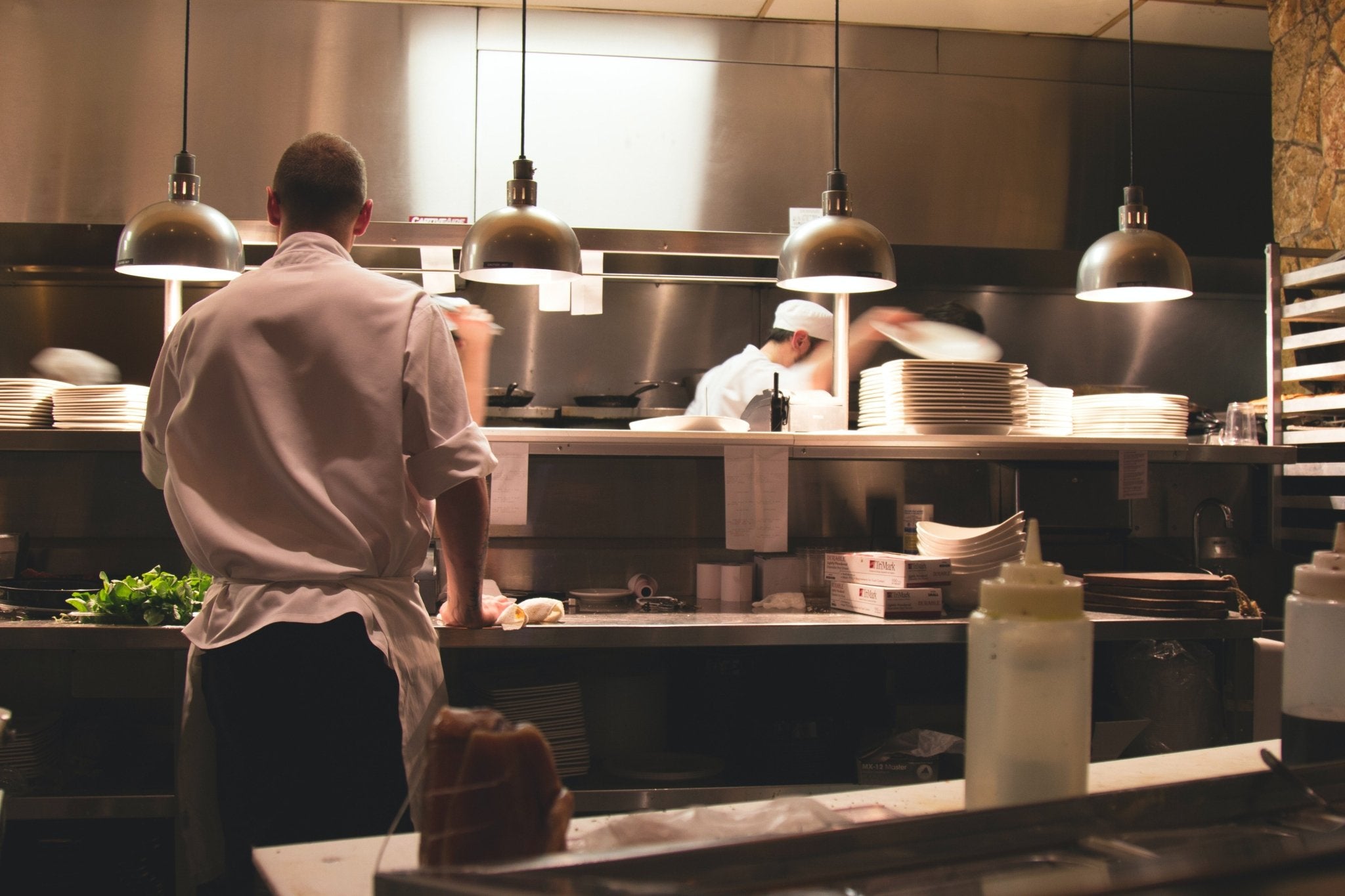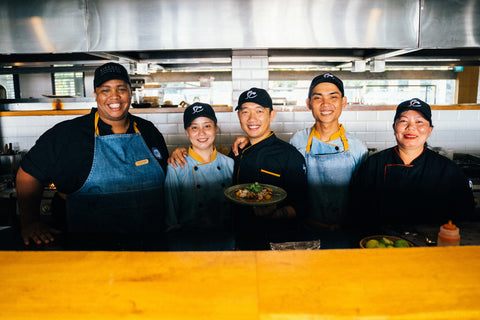What Are The Differences Between A Cook And A Chef?

There is a thin line between who a cook is and who a chef is to the layman. A cook and chef are interchangeable terms used for skilled individuals who work in the kitchen. It does not matter whether the are washing dishes, cutting vegetables, or making a sumptuous dessert.
To those in the culinary industry, there is a huge gap between both professions.
These differences account for the level of qualification required and how much each professional gets paid. Each discipline also has unique ranks that must be passed through to climb the ladder of success in the food industry.
Who is a Cook, and who is a Chef?

A chef is a trained professional cook and tradesman who is proficient in food preparation, often focusing on a particular cuisine. A Chef is trained to create recipes from scratch and has a high level of responsibility within a kitchen.
On the other hand, a cook is someone who prepares and cooks food following already established recipes.
A Chef's role is more diverse and transcends activities in the kitchen. The job of a cook ends when they step out of the kitchen. For a Chef, it perhaps could have just begun. This accounts for the pay gap between both professions.
What are the Roles of a Cook?
The roles of a cook are pretty straightforward.
A cook spends most of his time cooking different meals. They are trained to follow already existing recipes and are well-rounded in making a diverse range of meals.
Other activities a cook partakes in are those that involve taking care of the kitchen.

A cook can work with a team or alone. You would often find them in establishments that have nothing to do with food, for example, schools, hospitals, and companies.
People or organizations that hire cooks want them to make great meals for fulfillment instead of those who want the experience itself.
Becoming a cook requires less training than is necessary for chefs. However, cooks can more easily become chefs by taking advanced courses in a culinary school.
It would be easier for them to be absorbed into the industry because they already have the experience.
What are the Roles of a Chef?
A chef is more likely to work in an environment where food is the central goal, for example, restaurants. Chefs are trained to create recipes from scratch; thus, they better understand food and flavors. They know the ingredients that work, and they are creative about trying new techniques to improve existing recipes.

Chefs cook food as an experience. They pay attention to the flavors, the ingredients, and the dressing. For a chef, the meal's quality is determined not only by the taste but also by its uniqueness and presentation. A chef's responsibilities go beyond cooking alone. Chefs are responsible for developing menus either partly or on their own. They play managerial and supervisory roles in the kitchen. They also communicate with the managers who value their input.
A chef, as opposed to a cook, tends to specialize in an aspect of expertise. There are Sous-Chef, Chef de Partie, Chef de Cuisine, and Pastry Chef.
Each aspect requires a specific training curriculum. To excel as a chef, you must take professional training. Having a culinary degree will help you rise in the ranks. Another route that is often recognized is apprenticeship under a well-seasoned chef.
Kitchen Hierarchy
The kitchen hierarchy is called Brigade de Cuisine. It is a French term that was coined to allocate specific duties to individuals in the kitchen. This helps to ensure smooth kitchen operations.
To become successful, just like any profession, you need to pass through the ranks, often starting from the lowest and gradually moving up.
Cooks and chefs have ranks they must pass through as they grow.

Cook Hierarchy
The hierarchy for chefs is well known.
Cooks also have stages they must pass through before they can be called professionals.
● Stagiaire - Stage means internship in French. Stagiaire, on the other hand, implies an intern or trainee. They are mostly fresh out of culinary school or are enrolled for an apprenticeship.
● Kitchen porters assist in the general cleaning of the kitchen. This involves; washing up and cleaning all kitchen wares, unloading and putting away deliverables, emptying bins, sweeping and mopping floors, ensuring all equipment is clean and arranged properly.
● Junior Cooks/Commis - This is the preliminary stage to becoming a line cook. Here the cook works under a line cook and learns the ropes to manage a section of a line.
● Line Cooks -They are in charge of the food on a kitchen assembly line. They oversee a station that prepares a specific type of food. They might work in a restaurant, hotel, or corporate cafeteria.
Chef Hierarchy
Chefs have roles that go beyond merely cooking food. They are tasked with creating menus, creating recipes, and sometimes they undertake managerial duties.
Their ranks are;
● Chef de Partie (Station Chefs) - They are in charge of a particular section of food production in the kitchen. They are sometimes assigned assistant cooks, although most kitchens have only one overseeing that department.
● Sous Chef - "Sous" is a French word for "under." A Sous Chef is under the direct command of the Executive Chef. He is the right-hand executive chef and holds a huge responsibility in the kitchen. Sous Chefs manage a staff of assistant chefs, cooks, and kitchen workers and create dishes for the menu.
● Chef de Cuisine - A chef de cuisine or head chef is a chef that leads and manages the kitchen and chefs of a restaurant or hotel. They are involved in the day-to-day activities of the kitchen, from managing kitchen staff and controlling kitchen costs to liaising with suppliers and creating the menus.
● Executive Chef - The executive chefs are at the pinnacle of their chef careers. At this stage, they do more negligible cooking and more managing. They are often employed by big restaurants where they manage more than one outlet.

Chefs are more highly respected and recognized than Cooks. This is because of the training required to earn the title. They are also paid higher salaries as a result of this.
Chefs have the freedom to be creative while discharging their duties; they can create recipes at will. This makes their job more exciting.
Cooks do not enjoy some of the luxuries that Chefs enjoy. They have to follow recipes that take away the creativity from their job. They are also paid less than a Chef even when they work longer hours. Unlike chefs, cooks are less likely to specialize in an aspect of cooking. This makes it easy for them to cook a wide variety of dishes well.

Both professionals are invaluable assets in any kitchen. We need chefs just as much as we need cooks. Their differences allow them to attend to different needs in every community.
Cooks are needed in hospitals, schools, companies(that make provision for lunch), prisons, etc.
Chefs are needed in restaurants, hotels, etc.
Also, a cook can upgrade to a Chef by simply taking certified culinary courses.
Here at Chef Sac, our role is to serve culinary mavericks - a culinary community proudly catering to cooks and chefs! Whether you're new to the kitchen, or have been cooking for decades, we have something for everyone!
- Tags: brigade de cuisine Chef de Cuisine culinary arts culinary students Executive Chef Junior Cooks Line Cooks Sous Chef Stagiaire Station Chefs types of chef
1 comment



thanks